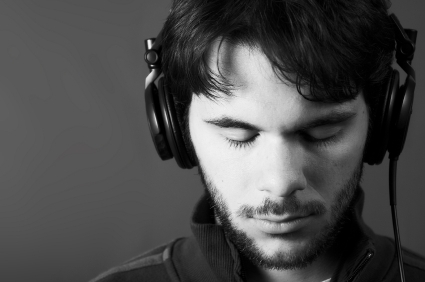(Note: a version of this article originally appeared on relevantmagazine.com.)
 A couple weeks ago, I started having trouble sleeping. Normally, I don’t struggle with getting to sleep, but I’ve got a lot going on right now.
A couple weeks ago, I started having trouble sleeping. Normally, I don’t struggle with getting to sleep, but I’ve got a lot going on right now.
I have a big project deadline coming up at work, my daughter (who has special needs) is starting school again next week with a new aide, and I have a friend who was rushed to shock trauma the other day with a serious medical issue, These are just a few of the topics that weigh on me as I try unsuccessfully to drift into unconsciousness.
I just lay there with those pieces of uncertainty or unfinished business angrily glowing on the checklist of my mind.
Tape recorders of potential upcoming conversations keep playing and rewinding over and over and over again as I’m planning how to deal with existing problems; then trying to figure out what unforeseen problems are coming my way, waiting to burst all over me like a dam.
Somewhere in there, I remember Jesus saying not to worry about tomorrow.
But wasn’t Jesus worried in the Garden of Gethsemane as he literally sweat blood and asked the father to remove the cup of suffering from which Jesus was about to have to drink deeply?
So how is this whole ‘don’t worry’ thing supposed to look in my life?
Should I not be trying to foresee issues and how to resolve them?
What’s the line between ‘not worrying’ and ‘being naive and unprepared for life’?
Trusting in God’s Strength
In Philippians 4, Paul says that he has learned the secret of living whether he has plenty or is in need, and that secret was that he could do all things because of the strength that God gives.
So to Paul, not worrying means we live in confidence of God’s strength.
Worry therefore, is the opposite: it is when we live without confidence in God’s strength.
Because if I were to vocalize my worry, it would probably sound like this, “When I don’t know what’s going to happen, I don’t have much control over the outcome, and I’m not comfortable with that arrangement.”
That’s a lot different than Paul’s approach which didn’t depend on the situation, but in the unchanging nature and character of God.
Trust vs. Control
Trusting in God doesn’t mean we have to love the situations we find ourselves in. Jesus clearly didn’t love the day of agony and abandonment he was facing.
Paul wasn’t hoping to endure more shipwrecks and stonings.
I don’t want my car to break down, or for my daughter to have a hard time at school; but the question I ask is whether those things loom larger in my mind than God’s goodness and his sovereignty (that is, the fact that he is in control and that he cares about me).
Because if my issues and problems are bigger than God in my own eyes, they will have a bigger influence in my life than God does; and that is what noted and respected biblical scholars like to refer to as ‘a bad idea’.
There’s nothing wrong with making plans and preparations, but if we ignore the nature of God (all powerful, all knowing, all present), how much good can our plans really do?
This doesn’t mean we should run to the opposite approach, embodied by the ancient Stoics who believed that you could only find peace once you accepted that the universe was giving you the best possible outcomes and you obtained peace by accepting everything without question.
We serve a God that has invited us in to his plans of making all things new. He says we have a part to play in that process. Rather than accepting everything the way it is, we can push back against injustice and heartache in our world.
But in the midst of all this, how do we incorporate trust in God’s strength into our everyday lives?
I love to look for ways to make the scriptures practically applicable in my life. When I’m facing worry, I think Paul lobs us a softball in Philippians 4:6-7 (the same chapter where he talks about having the secret to contentment):
“Don’t worry about anything; instead, pray about everything. Tell God what you need, and thank him for all he has done. Then you will experience God’s peace, which exceeds anything we can understand. His peace will guard your hearts and minds as you live in Christ Jesus.”
I like to boil this down to a pseudo mathematical formula:
Pray + Thank = Peace.
This is definitely not about telling God what you want him to do. This is about remembering his nature and character.
Look at Jesus praying in Gethsemane. His prayer wasn’t even about uncertainty. Most of us would probably agree that Jesus knew everything that was coming his way when he was praying in Gethsemane. His prayer was about asking God for strength.
Prayer may not result in God ‘fixing your situation’ the way you would demand from a genie, but he gives us promises that will strengthen us as we seek his will both in and through our lives.
If you’re following Jesus, I’m guessing you have a story or two about instances where things seemed pretty hopeless, but in the end they worked out.
Maybe that’s part of your salvation experience.
Hopefully you have another story or two of times you cried out to God and he responded. Remind yourself of those stories.
God is not a mean kid with a magnifying glass on an anthill. You are not foolish to trust him.
In addition to loving you, God has invested a great deal into you - he’s not going to kick you to the curb.
Thank him for what he’s done, and choose to exercise faith by thanking him in advance for what he will do.
Usually, my worry is directly linked to my ability to comprehend the ‘master plan’. I say stuff like, “I’m willing to trust God, I just want to know what he’s up to.”
Jesus says that his peace goes beyond all understanding, so our ability to ‘stop worrying’ isn't linked to our ability to figure stuff out.
In fact, our uncertainty about the future is a chance to trust God.
God is faithful to us even (especially?) when we don’t deserve it.
So in the times when I don’t get why God is allowing something in my life - I didn’t get into the school of my choice, or I didn’t get hired into a place that I think would have been perfect - it’s an opportunity to reflect some of that faithfulness to God.
- Remember who is in control
Dr. Henry Cloud, in the Boundaries books series, teaches us that we do not control other people. We may also not have very much control over situations that we have to face, but we are ridiculously in control of ourselves.
Dr. Emmerson Eggerichs in Love and Respect, says it this way: “Your response is your responsibility.”
You can’t decide whether your identity is going to be stolen, or if you will contract a disease, or if your computer suddenly stops working.
You can take steps to lower your risk, sure, but guarantee that they won’t happen? No chance.
But what you are 100% in charge of is how you will respond to the risk.
I think this is what Jesus is talking about in Luke 12 when he challenges us by asking, “Can all your worries add a single moment to your life? And if worry can’t accomplish a little thing like that, what’s the use of worrying over bigger things?”
I take him to say, ‘Trust God in the stuff that you have no control over’.
Maybe this last thought will put you at ease - stop worrying whether bad things will happen, because they will. Jesus promised that in this world, we would have trouble. So instead of worrying about if or when or what, spend your time becoming the kind of person who responds in healthy ways to the challenges of this life.
Make plans, create strategies for life, but in the midst of it all, draw strength from your trust in God no matter what comes your way. Pray, give thanks, and be at peace.

















